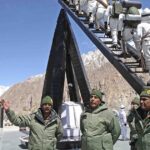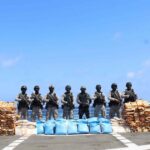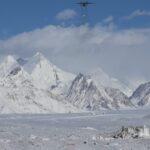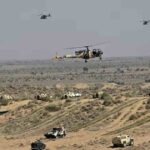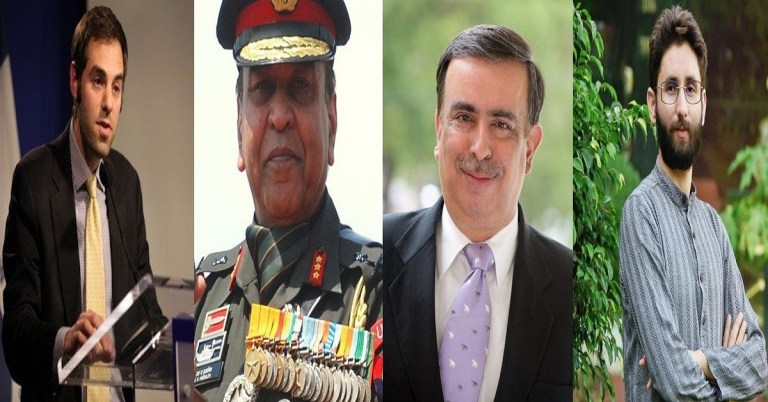
SOURCE: OPINDIA
A webinar was conducted by the Usanas Foundation on the 20th of November which highlighted the Pakistani invasion of Kashmir in 1947 and the atrocities they unleashed on the people of the region. Dr. Michael Kugelman, Deputy Director of the Asia Program at the Woodrow Wilson Center, Lt. General Ata Hasnain, Kashmiri politician Mir Junaid and Professor Amitabh Mattoo were the eminent speakers at the webinar. The event was moderated by Abhinav Pandya, CEO of the Usanas Foundation.
The speakers highlighted the nature of the invasion of Kashmir in October 1947 and focused on the wrong narrative about the region that continues to permeate discussions around the topic in international circles. Dr. Kugelman provided insights into how the Biden administration in the United States will approach the subject.
Lt. Gen. Ata Hasnain
Lt. Gen. Hasnain said, “For the last 70 years, the international community has only heard false narratives regarding the events of 22nd October 1947 and India has willingly or unwillingly been unable to correct that perception. India has believed that the events that happened on 22nd and the days that followed were something of history. As these false narratives were not addressed during the initial phase, they have become deeply engrained within the international community.”
“The narrative that has been created is that Kashmir is a Muslim majority region and therefore belongs in Pakistan because it is an Islamic nation. Another false narrative is that India used force and coercion to force the Maharaja to sign the Instrument of Accession and then, in order to make it look legitimate, moved in its troops on the 27th. They further state that India forcefully took over Kashmir and that is why that part of Kashmir is ‘illegitimately’ with India,” he added.
Lt. Gen. Hasnain stated further, “From 1948-72, Pakistan has tried to use force to capture Kashmir and despite that, they have claimed that they were the first to implement the United Nation resolution regarding Kashmir. History has overtaken the UN resolution of 1948-49 because Pakistan has tried to change the narrative by force. While many countries around the world, especially India’s allies believe the narrative put forward by India, many people around the world do not believe in that narrative. That is why, a much more comprehensive attempt must be made to show the world the true narrative of what happened on 22nd October 1947.”
He further said that the events did not begin in October but plans for it were already made as early as June, 1947. The territory of Jammu & Kashmir is extremely important due to its geostrategic significance and hence, Pakistan did not want to lose it. It did not care whether the region was Hindu-majority or Muslim. Furthermore, Pakistan did not have a standing army after the partition and was aware that it would take some time to build one. Therefore, they made use of the tribals and struck a deal with them.
Professor Amitabh Mattoo on Kashmir invasion
Professor Amitabh Mattoo spoke about the resistance to the invaders by the natives of the region. He said that before the Indian Army landed in Kashmir, the men, women and children of the region trained themselves in the use of firearms so that they could defend themselves against the invading forces.
He said, “Men, women and even teenagers took up arms against the Pakistan aided invaders. This civil resistance prevented an onslaught on Srinagar. In the absence of these patriotic fighters, Srinagar would have suffered much greater damage on par with other regions of Kashmir. ‘Hamlavar Khabardar, hum Kasmeri hai Taiyar’, Kadam Kadam Bharenge Hum, Mahhaz pe larenge hum’- some slogans that were used by Kashmiris during the tribal invasion. Kashmiris led by Kashmiris from all classes and faiths took up arms to defend the region.”
In this context, Professor Mattoo recalled the contribution of 19-year-old Maqbool Sherwani. He stated, “The residency road in Srinagar was once upon a time know after Sherwani but is no longer referred to as such but is referred to as the ‘British residency’ road. Sherwani’s life and legacy, as well as his ideals must be mainstreamed throughout the country. Every part of India should carry a chapter on the life of Maqbool Sherwani because this is the history that everyone in India should grow up with, the frontline of resistance against the Pakistani tribal invaders were Kashmiris. Sherwani, through guile, false rumors and Kashmiri charm managed to singlehandedly delay the Pakistani backed tribals.”
“Due to his actions, he was tortured and crucified. Before the invasion, Sherwani even disrupted Jinnah’s speech in Srinagar before the invasion. As per eye witness accounts, Sherwani before his death cried out ‘victory for the unity of Sikhs, Hindus and Muslims’. Mahatma Gandhi has also referred to Sherwani and stated that his martyrdom would make anyone proud. His legend and story is unfortunately forgotten, his ideals closely represented those of India. It’s important that that the tales and actions of Local heroes who resisted the Pakistan backed tribals be part of any narrative that India decides to push forward in order to show that the Kashmiris themselves were the first to take up arms against the invaders,” he added.
Mir Junaid
The Kashmiri politician commented that Kashmiri have forgotten the truth of October 1947, as a consequence of which, they have fallen prey to the false narrative of Azadi created by Pakistan. He also lamented the fact that the educated elites of Jammu & Kashmir have demonstrated scant regard for the history of the region.
Most significantly, Junaid remarked that if things had progressed naturally, Jammu & Kashmir would have been part of India anyway. “J&K was naturally suited to join India instead of Pakistan that had already declared itself as an Islamic country. J&K saw a future in democratic India and if things had progressed naturally, J&K would have joined India.”
Furthermore, he stated, “The main point of interest is not the Accession of Kashmir by India, but the invasion of Kashmir by Pakistan backed tribals. People in India seem to have forgotten the history of Kashmir and Pakistan has been able to use this ignorance to change its image from a murderer to a messiah. The horrors caused by Pakistan on 22nd Oct 1947 has been erased from the minds of Kashmiris that have been used as proxies by Pakistan.”
“Pakistan’s purpose from its inception has been the destruction of India. Pakistan has used these proxies in order to conduct on of the most brutal insurgencies in the world. It has stripped Kashmiris of its multi-cultural identity and the most brutal mass exodus in Kashmir took place by the order of Pakistan to its proxies. This has led to the social isolation of Kashmiri Muslims and the generation born after are totally unaware of the true multi-cultural identity of Kashmir,” he added.
Mir Junaid further stated that Article 370 has been a contributing factor in what has been going on in Kashmir since independence. He further stated that all Article 370 ever achieved is enable corruption and limit the corridors of power and the grants that were provided by the central government were used to create hollow institutions that could not win the confidence of the people.
Dr. Michael Kugelman on Joe Biden’s likely Kashmir approach
Dr. Michael Kugelman commented on the policy approach that the Biden administration in the United States will likely adopt regarding Kashmir. Significantly, he said, “The incoming Biden administration may be more willing to talk about the Kashmir issue privately but the issue will not be a high priority. There has been very little said by the Biden-Harris camp about the Kashmir. All references made by the Biden-Harris camp have been attempts to garner votes at home before the election rather than concrete promises of action.”
“The only way that Kashmir is currently seen by the US is as a stability issue, Kashmir has been the spark of multiple wars between India and Pakistan. Kashmir will not be a big priority and the incoming administration will more likely focus on domestic problems such as the ongoing pandemic and socio-economic troubles,” he added.
Dr. Kugelman further added that Joe Biden, the presumptive president-elect, “sees India-US relationship above all as a counter-terrorism partnership and countering China is a secondary aspect.” “This importance to terrorism given by Biden suggests that Biden taking a harder stance against Pakistan when it comes to India or Kashmir centric extremists. In the event of a Pulwama 2.0, the US administration would be fully behind India. But US is unlikely take too hard a stance against Pakistan because of the ongoing Afghan peace deal will require some dialogue with Pakistan,” he added.

